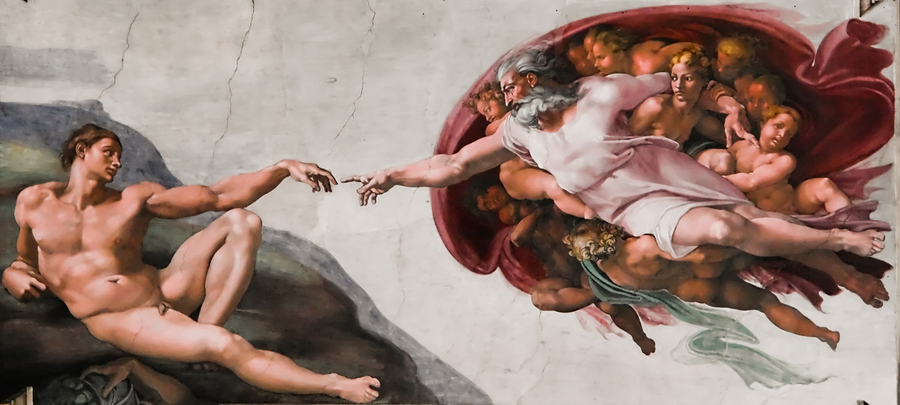A Light-Hearted Philosophical Evaluation
Who is God is an excellent religious and philosophical question? Asking who already denotes that the questioner suspects that God is a person or some individual.
If you suspect or presuppose God is an impersonal force, the question would be framed, what is God?

You see, we have two options regarding God. Either God displays personality and offers some possible social interaction, or God is an impersonal force or power. Either God has intelligence, or he does not. A force or power, like gravity or radiation or random scientific principles, acts without care. God as a force would be better classified as science or nature, rather than a person. Just as we cannot blame the tornado for tearing through a town, if God were a force, we could not offer any complaint about evil other than man himself.

In philosophy and science, man reaches to find God, attempting to determine the nature of the universe. In religion, man (prophets) says that God spoke to humanity, holding tablets in outstretched arms repeating, “this is what God said.” We will consider each religious view of God separately. This article will discuss who we would expect God to be if he is personal and relationally oriented. So who is God, not religiously but philosophically, as a person?
Informational Article
In our search for God, we are searching for a person, not an impersonal force.
God is a being than which nothing greater can be conceived.

I love science fiction and fantasy, whether books, movies, anime, or games. They are a fun genre where one can imagine, dream, and contemplate existence. I don’t particularly enjoy horror, but something is fascinating about the Alien’s series. The most recent installment Prometheus suggests that these “engineers” created man and other species, including the progenitors to the deadly Aliens.
Houston, We Have A Problem.
In other science fiction shows like Star Trek: TNG, the episode The Chase tries to envision who established life on earth. What we discover is life was caused by intelligence.
Cause And Effect
Scientists, writers, and philosophers wonder and speculate about human origins, but the question is where X came from, whether “engineers” or the sentient race that created man. Everything that is an effect has a cause. Most of us have heard of cause and effect.
If I strike this keyboard (cause), these letters, forming sentences, are the effect. But my fingers were told by my brain to strike the keys. What caused my brain to send a signal to my fingers?
First Cause
Regarding existence, each birth (effect) had a cause (parents, insemination) back and back we go to the first humans, back and back to the very first life. Then further back in time, we fly, cause and effect, cause and effect, until we arrive at the universe’s first instance.
Who Is God? An Eternal, Non-Caused Being.
Can we even fathom a truly eternal uncaused Being? A Being who is the original first cause. This is the Being, who I term God. When I philosophically consider God, this would be the only Being.
We might view our creators as a god, but if our creator was, in fact, caused, what or who caused him? The beings in Star Trek died out. God would not, cannot.
Historical Absolute Truth And The First Cause
Depending on your definition of God, there could be more than one god, but there is only one First Cause.
There is only one way the universe came into existence. There is only one way I am sitting here. There is only one way that the earth was formed.
History is history and is unchangeable. We live a linear existence in time. We could get esoteric and talk about alternate timelines, multiverse, etc. But we are discussing our reality, which is the only reality we know.
There is one First Cause of Life. One first cause of the universe. And this revealed reality is so complex that it requires intelligence, not a force, not an accident.
God Is An Eternal, Non-Caused Being, Who Caused Our Universe To Exist
So I just finished with my own mental machinations, reasons, and explanations about who I expect God to be.
Is any God that we conceive who is not eternal, omnipotent, omniscient, omnipresent, non-caused, actually God?
Based on the idea of a first cause, I surmised that there is only one God, that everything goes back and back to a single point in time and space, and that God is the first cause or prime mover. But this only tells us that he caused the universe to exist, not the nature of who God is.
But How Do I Know?
This is the bane of philosophy, a branch called epistemology. Each of us is a seeker—the proverbial blind man touching the elephant.
I would love to say philosophically we can determine who God is, but we cannot. We bring our biases, our limited knowledge, and our preconceived notions, forming a God to fit into a box of our own design.
God could be the absent watchmaker who started everything but then leaves the universe to run. We could envision a theistic evolution where God created the first life but then allowed everything to run unimpeded.
We could infer from this that God is an absent Father who impregnated space-time and then split town.
Philosophical Assumptions
You see, when we ask who God is, philosophical theories abound. We could construct numerous scenarios; there could be aliens, races of “gods,” we could be the embodiment of the universe manifesting itself, or make our own religion of Scientology.
But how do we know anything about the nature of a universe and death that is beyond our understanding? Philosophy cannot answer the question: who is God.
The word philosophy simply means the pursuit of wisdom, the purpose of life, and a search for Truth. However, this quest, because it originates with man, can never find the answers. In fact, man cannot reach God or know God through intellectual pursuit.
Next Steps
I reasoned that a realistic search for God required examining all extant religions. Maybe we could learn who God is through a dead religion, but why would God allow his message to die?
Wouldn’t God announce himself to multiple people? If you were God, how and why would you tell every man, woman, and child who you were?
Still unsure God exists? Revisit sections on atheism.
What would a communication from God display?
Review philosophical attributes of God: Eternality, non-caused, omnipresent, omnipotent, and omniscience.
What Next?
- What is the crucial concept?
- Why is that significant?
- If you agree, the next steps
- If you disagree, please consider reading

Leave a Reply